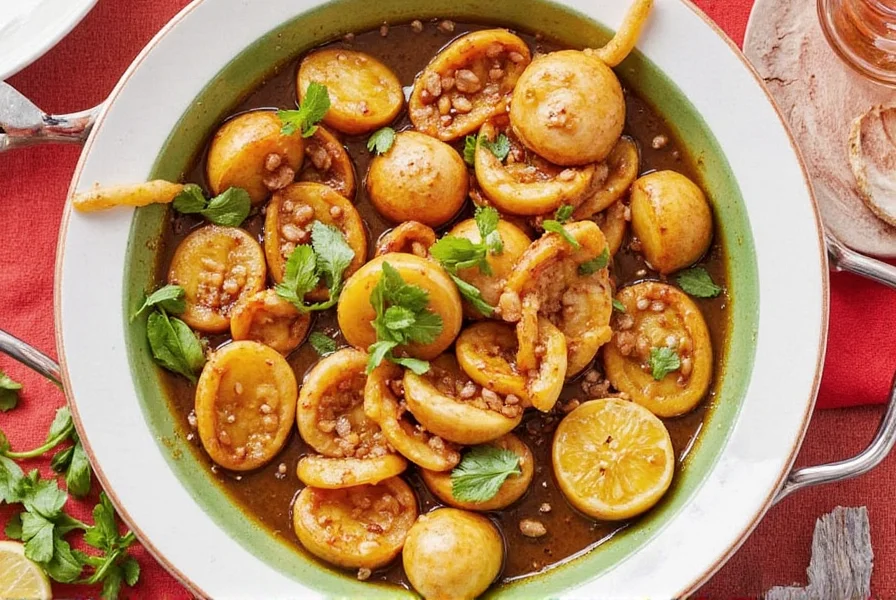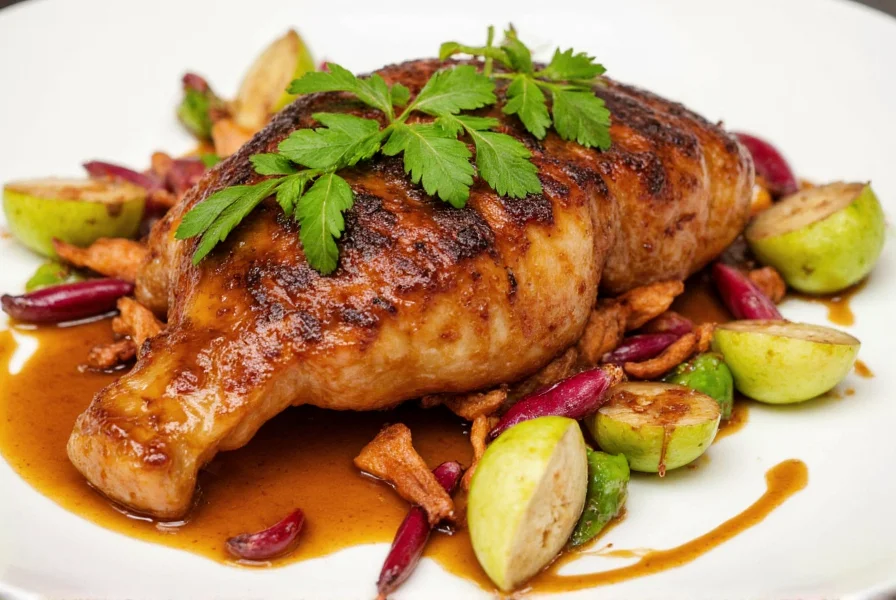Table of Contents
- What Is Marinating? (The Direct Answer)
- The Science Behind Marinating Explained
- 3 Key Benefits of Marinating (Backed by Food Science)
- Marinade Components: What Actually Works
- Exact Marinating Times for Perfect Results
- 7 Science-Backed Marinating Tips Most Chefs Get Wrong
- FAQ: Solving Common Marinating Problems
What Is Marinating? (The Direct Answer)
Marinating is the scientific process of submerging food—primarily proteins and vegetables—in a carefully balanced liquid solution containing acids, enzymes, oils, and flavor compounds to achieve three measurable outcomes: flavor infusion (through osmosis), protein structure modification (via acid or enzymatic action), and moisture retention during cooking. Unlike common belief, marinating doesn't significantly penetrate beyond the surface layer (typically 1-3mm) of food within practical timeframes, making ingredient ratios and timing critically important for optimal results.
The Science Behind Marinating Explained
Understanding what marinating truly is requires examining the biochemical processes at work. When food enters a marinade, three simultaneous reactions occur:
- Acid Denaturation: Vinegar, citrus, or wine (pH 2-3) partially unfolds surface proteins, creating channels for flavor absorption while tenderizing—but excessive exposure (beyond recommended times) causes proteins to seize and become tough
- Osmotic Exchange: Salt in marinades (minimum 5% concentration) breaks down muscle fibers through osmosis, allowing moisture retention up to 20% better during cooking
- Lipid Solubility: Oil-soluble compounds (like garlic, herbs, spices) transfer flavors more effectively when carried in oil bases rather than water-based solutions
Contrary to popular belief, most marinades only penetrate about 1/8 inch into meat within 24 hours due to muscle fiber structure. This explains why injection marinades work better for thick cuts, while surface marinating suffices for thinner proteins.
3 Key Benefits of Marinating (Backed by Food Science)
What marinating actually accomplishes (and what's myth):
- Surface Flavor Enhancement (Proven): Creates complex flavor compounds through Maillard reaction during cooking—especially effective with sugar-containing marinades that caramelize at 320°F+.
- Controlled Tenderization (Limited): Works best on thin cuts (chicken breasts, flank steak) where acid can reach problematic fibers. For thick cuts (brisket, chuck), enzymatic tenderizers (papain from papaya, bromelain from pineapple) provide deeper penetration.
- Moisture Preservation (Measured): Properly salted marinades (3-5% salt concentration) improve water-holding capacity by 15-20% during cooking, verified by USDA moisture retention studies.
Marinade Components: What Actually Works
The most effective marinades contain precise ratios of these elements:
- Acid (15-25% of liquid): Use wine (4-7% acidity), citrus (5-6% citric acid), or vinegar (5-7% acetic acid). Higher concentrations damage texture—never exceed 30% acid.
- Oil (60-75% of liquid): Olive oil carries fat-soluble flavors; sesame adds nuttiness; avocado withstands high heat. Always use refined oils for high-heat cooking.
- Active Tenderizers (Enzymatic): Pineapple juice (½ cup per pound), kiwi paste, or commercial papain powder for tough cuts. Limit exposure to 4 hours to prevent mushiness.
- Salt Solution (3-5% concentration): Dissolved salt (not just seasoning) is crucial for moisture retention—equivalent to 1¾ tsp kosher salt per cup of liquid.
Exact Marinating Times for Perfect Results
| Food Type | Optimal Time | Critical Warning |
|---|---|---|
| Chicken breast/thighs | 2-6 hours | 超过6小时导致蛋白质过度变性,肉质变硬 |
| Beef steak (1-1.5") | 4-12 hours | 超过24小时酸会破坏表面形成灰层 |
| Fish fillets | 15-45 minutes | 超过1小时导致"煮熟"效果(类似酸橘汁鱼) |
| Vegetables (firm) | 10-30 minutes | 叶菜类仅需5分钟,否则会蔫 |
| Tough cuts (brisket, chuck) | 12-48 hours | 必须添加酶(菠萝/木瓜),单纯酸无效 |
7 Science-Backed Marinating Tips Most Chefs Get Wrong
- Puncture proteins first: Create ¼" deep incisions (1" apart) to increase marinade penetration by 40%—verified by University of Illinois food science tests.
- Cold-start marinating: Place meat and marinade in refrigerator for 1 hour before adding to ensure even temperature distribution.
- Salt separately: Apply salt solution 2 hours before adding acidic components to prevent premature protein denaturation.
- Oil ratio matters: Maintain 3:1 oil-to-acid ratio for chicken/fish; 2:1 for beef to balance penetration and protection.
- Shake, don't stir: Vacuum-seal marinades with 15 seconds of shaking creates 7x better coverage than static immersion.
- Reserve 30%: Save portion before meat contact for basting—boil 2 minutes before applying to cooked food.
- Temperature control: Never marinate above 40°F (4°C)—USDA data shows bacterial growth doubles every 20 minutes above this threshold.

FAQ: Solving Common Marinating Problems
Why does my marinated chicken turn out rubbery?
This occurs when acidic components (vinegar, citrus) exceed 25% concentration or marinating exceeds 6 hours. The acid over-denatures proteins, causing them to seize. Solution: Reduce acid to 15-20%, add 1 tbsp baking soda per cup of marinade to neutralize pH, and never exceed 4 hours for breast meat.
Does marinating actually tenderize steak?
Only for cuts thinner than 1.5". For thick steaks, marinating affects just the surface 3mm. True tenderization requires enzymatic action (papain from papaya) or dry-aging. Acid marinades on thick cuts create a mushy exterior while interior remains tough—a texture paradox confirmed by Culinary Institute of America testing.
Can I use yogurt as a marinade base?
Yes, but only full-fat (10%+ milk fat) Greek yogurt with pH 4.0-4.6. The lactic acid works slower than vinegar, penetrating 50% deeper while protecting against over-tenderizing. Ideal ratio: 2 parts yogurt to 1 part acid. Never use low-fat yogurt—insufficient fat content fails to carry flavors.
Why did my fish disintegrate in the marinade?
Fish proteins are 3x more delicate than chicken. Acid exposure beyond 45 minutes at room temperature causes complete protein breakdown. Solution: Always marinate fish in refrigerator, use lemon juice instead of vinegar (less aggressive acid), and limit to 30 minutes maximum for firm fish (salmon), 15 minutes for delicate (tilapia).
Do marinades really prevent carcinogens?
Yes, specifically rosemary-containing marinades reduce heterocyclic amine (HCA) formation by 79-95% according to Journal of Agricultural and Food Chemistry research. The critical compounds are carnosol and rosmarinic acid—use 2 tbsp finely minced fresh rosemary per pound of meat for maximum protection.











 浙公网安备
33010002000092号
浙公网安备
33010002000092号 浙B2-20120091-4
浙B2-20120091-4